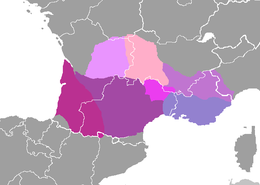ഒസിറ്റാൻ
ദക്ഷിണ ഫ്രാൻസ്, ഇറ്റലി, മൊണാക്കോ, സ്പെയിൻ, തുടങ്ങിയ നാടുകളിലെ ഒരു പ്രാദേശിക ഭാഷയാണ് ഒസിറ്റാൻ. [8]
| Occitan | |
|---|---|
| occitan, lenga d'òc | |
| ഉത്ഭവിച്ച ദേശം | France, Spain, Italy, Monaco |
മാതൃഭാഷയായി സംസാരിക്കുന്നവർ | estimates range from 1,00,000 to 8,00,000 (2007–2012)[1][2] |
പൂർവ്വികരൂപം | |
| ഭാഷാഭേദങ്ങൾ |
|
| ഔദ്യോഗിക സ്ഥിതി | |
ഔദ്യോഗിക പദവി | Catalonia (Spain) |
Recognised minority language in | |
| Regulated by | Conselh de la Lenga Occitana;[4] Congrès Permanent de la Lenga Occitana;[5] Institut d'Estudis Aranesi[6] |
| ഭാഷാ കോഡുകൾ | |
| ISO 639-1 | oc |
| ISO 639-2 | oci |
| ISO 639-3 | oci – inclusive codeIndividual code: sdt – (Judeo-Occitan) |
| ഗ്ലോട്ടോലോഗ് | occi1239[7] |
| Linguasphere | 51-AAA-g & 51-AAA-f |
 | |
 various dialects of Occitan | |
Name
തിരുത്തുകHistory of the modern term
തിരുത്തുകഉത്ഭവം
തിരുത്തുകGeographic distribution
തിരുത്തുകUsage in France
തിരുത്തുകUsage outside France
തിരുത്തുകDialects
തിരുത്തുകNotes
തിരുത്തുക- ↑ Fabrice BERNISSAN (2012). "Combien l'occitan compte de locuteurs en 2012 ?", Revue de Linguistique Romane, 76 (12/2011-07/2012), pp. 467-512
- ↑ « De fait, le nombre des locuteurs de l’occitan a pu être estimé par l’INED dans un premier temps à 526 000 personnes, puis à 789 000, » ("In fact, the number of occitan speakers was estimated by the French Demographics Institute at 526,000 people, then 789,000") Philippe Martel, "Qui parle occitan ?" in Langues et cité Archived 2012-03-16 at the Wayback Machine. n°10, December 2007.
- ↑ Norme in materia di tutela delle minoranze linguistiche storiche, Italian parliament
- ↑ "CLO's statements in Lingüistica Occitana (online review of Occitan linguistics)" (PDF). Archived from the original (PDF) on 2018-07-30. Retrieved 2016-07-25.
- ↑ "Congrès permanent de la langue occitane / Congrès permanent de la lenga occitana - Un nouvel organisme de régulation de l'occitan au service des usagers et des locuteurs". Archived from the original on 2012-01-27. Retrieved 2016-07-25.
- ↑ [1]
- ↑ Hammarström, Harald; Forkel, Robert; Haspelmath, Martin, eds. (2017). "Occitan". Glottolog 3.0. Jena, Germany: Max Planck Institute for the Science of Human History.
{{cite book}}: External link in|chapterurl=|chapterurl=ignored (|chapter-url=suggested) (help) - ↑ Friend, Julius W. (2012). Stateless Nations: Western European Regional Nationalisms and the Old Nations. Palgrave Macmillan. p. 80. ISBN 0-230-36179-X. Retrieved 5 March 2016.[പ്രവർത്തിക്കാത്ത കണ്ണി]